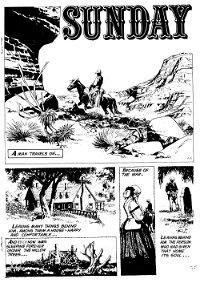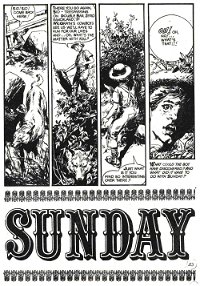A Man Called... Sunday by James Zee
A Man Called... Sunday
Alongside the comic's lead character, KG Murray's Ringo 24 gave cover-billing to a new series: "Introducing-- A man of courage who rides alone. A man called... Sunday".11Special thanks to Mark Muller and Spiros Xenos for images to illustrate this article....
From 1973 to 1977, Sunday appeared every issue and usually received cover promotion. The final Sunday episode is in Ringo 41, the comic's second last issue. Remarkably for KG Murray, all 18 episodes were printed in order and on a regular schedule.
The new series told the story of a Union colonel who returns from the civil war to discover his son missing and his wife killed by southern bandits. Sunday sets out to find his son, traversing the far-west and helping the people he meets.
Sunday is not a typical western protagonist for the time. He is a pacifist who repeatedly echoes, "Do not call me colonel, I remember the war". The series covers topics that were progressive for comics of the time, including unionism, abuses of the wealth, military corruption and freedom of the press. The stories are tinged with bitterness and the violence is not glorified.
Sunday was a product of the Spanish Selecciones Ilustradas agency, created in 1968 by artist Víctor de la Fuente (b. 1927) 22Born in Spain in 1927, Víctor de la Fuente began comics work in the studio of López Rubio in the... and author Víctor Mora (b. 1931).33Víctor Mora is one of Spain's most significant comic writers and he created El Capitán Trueno, the most popular Spanish... It was the first of several collaborations,44Including Les Anges d'Acier in Pilote (Dargaud, France), the famous French comic magazine that published Astérix et Obélix.... and just one of the westerns Víctor de la Fuente created and worked on during his career.55Victor de la Fuente worked on other popular Western series. In the mid-1970s he created Amargo (Hachette, Spain) and in...
Although it is frequently reported that Victor de la Fuente drew all of the Sunday stories, the series is the work of more than one Fuente. Their story illustrates much about the motivations and operation of the Selecciones Ilustradas agency.



